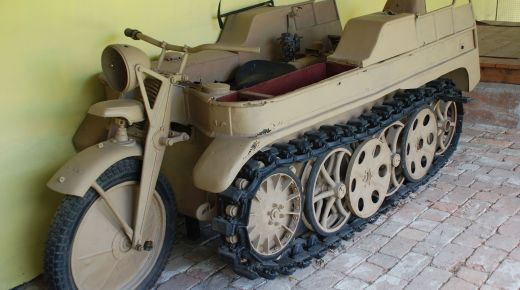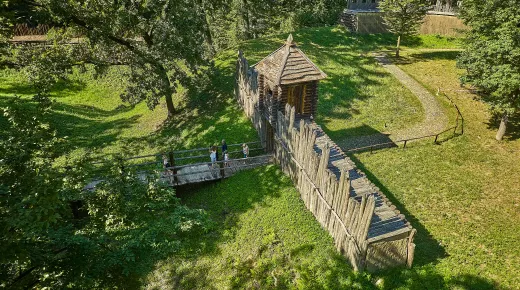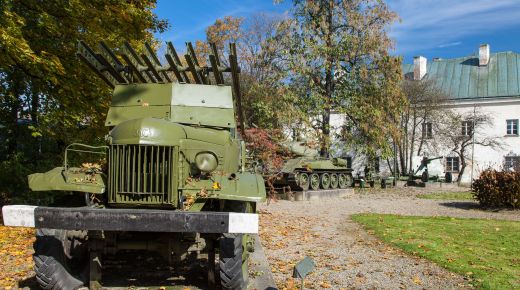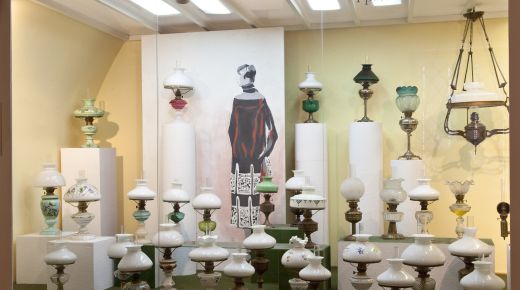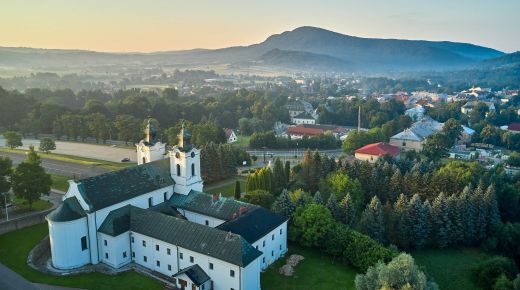For history lovers, the Low Beskid is a land of innumerable source materials, historical curiosities and memorials. Numerous attractions and exhibits that are of interest not only to archaeology enthusiasts and fans of militaria can be found here, as many of them are associated with stories of ordinary people that are unusual from today's perspective. Nowadays, they are a carrier of emotions anew, accompanying those events. One of them is a wedding dress made from a parachute - the only one of its kind preserved in Polish collections - on display in Krosno
The operations during World War I in the Low Beskids, where the war front was passing, caused great havoc and claimed thousands of victims. A special reminder of these events are the many Austrian war cemeteries from this period. Noteworthy is their organization. They form a network of necropolises, characterized by a high level of design.
Also unique in the world is the fact that soldiers of all warring sides were buried there, paying tribute to every life lost, unlike in most countries, where single, collective cemeteries were built and usually only for fallen soldiers of their own nationality. It is worth mentioning at this point one of the largest war necropolises in Poland, which is located in Dukla. More than 11,000 fallen from World Wars I and II of many nationalities rest here.
![Cmentarz wojenny I wś w Nowym Żmigrodzie nr 8. foto. H. Bielamowicz, CC BY-SA 4.0, https.commons.wikimedia.webp [241.09 KB]](https://podkarpackie.travel/storage/image/core_files/2023/4/25/2595ca6aa1320af22fbcedda39ab2443/webp/prot/preview/Cmentarz%20wojenny%20I%20wś%20w%20Nowym%20Żmigrodzie%20nr%208.%20foto.%20H.%20Bielamowicz,%20CC%20BY-SA%204.0,%20https.commons.wikimedia.webp) World War I war cemetery in Nowy Żmigród No. 8, photo by H. Bielamowicz
World War I war cemetery in Nowy Żmigród No. 8, photo by H. Bielamowicz
![Dukla T-34.webp [706.69 KB]](https://podkarpackie.travel/storage/image/core_files/2023/4/25/8b2c144899b033c8d6e635ff105b4d16/webp/prot/preview/Dukla%20T-34.webp) Open-air museum of militaria in Dukla, photo: Arch. Krosno County
Open-air museum of militaria in Dukla, photo: Arch. Krosno County
Dukla also has a Historical Museum with a number of military exhibitions. An open-air museum of heavy weapons, a must-see attraction for military fans, was also organized here - as one of the few of its kind in Poland. The collections and activities of the Dukla museum commemorate the events of the bloody battles for the Dukla Pass - the so-called Dukla-Pereszov Operation, which are an important page of history for the Slovaks and Hungarians and their military traditions.
In recent years, there has been increasing interest in collecting militaria and archaeological exploration on battlefields. Enthusiasts and those who want to spend time in an interesting way and meet people with passion are encouraged to visit private museums in the Low Beskids related to these topics. Two of them are located in Krosno - the Carpathian Museum of Weapons and Military Equipment (with an exhibition in Polany) and the Museum of the Subcarpathian Battlefields, where emotions are stirred by a dress made from a parachute, evoking not only the story of love in wartime, but also the memory of the largest Allied airdrop operation of armaments and military equipment in the Subcarpathian region, which took place in Lubla in 1944. Indeed, this parachute came from this action. However, the Frantisek Geisler Memorial Chamber in Pastwiska and the Museum of Militaria and Technology in Wola Sekowa are also worth a visit.
![Muzeum Militariów w Woli Sękowej.webp [208.39 KB]](https://podkarpackie.travel/storage/image/core_files/2023/5/16/c04d2b43721ec04debb5928ef13789ff/webp/prot/preview/Muzeum%20Militariów%20w%20Woli%20Sękowej.webp) Private Military Museum in Wola Sękowa, photo by Military Museum in Wola Sękowa
Private Military Museum in Wola Sękowa, photo by Military Museum in Wola Sękowa
![Karpacka Troja 11.webp [5.58 MB]](https://podkarpackie.travel/storage/image/core_files/2024/11/14/e0e774426b5b732c8c89d0bd66c7f513/webp/prot/preview/Karpacka%20Troja%2011.webp) Carpathian Troy, photo by Krystian Kłysewicz
Carpathian Troy, photo by Krystian Kłysewicz
An archaeological open-air museum in Trzcinica near Jaslo - Karpacka Troja - deserves a separate mention for tourists interested in the history of the Middle Ages. It is one of the most important archaeological sites in the country, providing knowledge about the prehistory of Central and Eastern Europe. In August, the open-air museum hosts the acclaimed Carpathian Archaeological Festival Two Faces, which features historical reconstructions with reenactors from all over Poland, as well as Lithuania, Slovakia and the Czech Republic. The popular warrior tournament is also a regular feature of the festival.
WORTH VISITING IN BESKID NISKI
Historical Museum - Dukla Palace
ul. Trakt Węgierski 5, 38-450 Dukla
tel. +48 13 433 00 85
Opening dates and times:
October-April: 10:00am-3:00pm, May-September: 10:00–16:30
Museum of Subcarpathian Half Battles in Krosno
ul. Czajkowskiego 92, 38-400 Krosno
tel. +48 502 994 116, +48 785 144 346
Opening dates and times:
September-May: Tues-Sun: 11:00 a.m. - 4:00 p.m., Monday - closed
June-August: Tues-Sun: 10:00-17:00, Mon - closed
Frantisek Geisler Memorial Chamber in Pastwiska
ul. Kardynała Karola Wojtyły, 38-400 Krosno
Advance contact required to visit the chamber
Museum of Militaria and Technology in Wola Sękowa
Wola Sękowa 52, 38-505 Bukowsko
Krzysztof Mindur: tel. +48 510 317 235
Advance contact required to visit the museum
42 World War I cemeteries belonging to the so-called Western Galician War Cemeteries, built during World War I under the direction of the War Graves Department of the Austro-Hungarian War Ministry:
- District I Nowy Żmigród (architect: Duszan Jurkowicz): Ożenna 1, Ożenna 2, Ożenna 3, Grab 4, Grab 5, Krempna 6, Desznica 7, Nowy Żmigród 8, Łysa Góra 9, Wola Cieklińska 10, Wola Cieklińska 11;
- District II Jasło (architect: Johann Jager): Cieklin 12, Cieklin 13, Cieklin 14, Harklowa 15, Osobnica 16, Osobnica 17, Dębowiec 18, Tarnowiec 19, Bierówka 20, Warzyce 21, Jasło-Ulaszowice 22, Jasło 23, Jasło 24, Trzcinica 25, Sławęcin 26, Bączal Górny 27, Jabłonica-Wałówka 28, Siepietnica 29, Święcany 30, Szerzyny 31, Szerzyny 32, Swoszowa 33, Ołpiny 34, Ołpiny 35, Podzamcze36, Krajowice 37, Nawsie Kołaczyckie 38, Kołaczyce 39, Bieździedza 40, Bieździadka 41, Sieklówka 42
Graves of those executed during World War II:
- Jasło - Krajowice mass grave of 260 Jews, executed in July 1942
- The non-existent village of Hałbów, on the route from Nowy Żmigród to Krempna, a mass grave of 1257 Jews shot on July 7, 1942.
- in the northeastern part of the Jewish cemetery in Krosno, there is a mass grave of an unspecified number of people shot on December 9, 1942
- Barwinek, foot of Bludna Hill, mass grave commemorated with an obelisk of Jews executed on 13 August 1942.
- Forest between Warzyce and Sieklówka -5,000 buried in 32 mass graves - these are Jews, Poles, Red Army soldiers and Roma executed by the Germans,
- Grabiński Forest between Iwonicz and Lubatowa - monument to 72 Poles - soldiers of the Home Army executed on 24 July 1944
- Lubatowa - monument and grave of 38 villagers relocated from Grabiński Forest
Cemeteries
- Krosno Communal Cemetery - Tomb of the Unknown Soldier, Grave of Poles killed in 1914 - 1920 and grave of soldiers killed in World War I, grave of Polish soldiers from 1939, quarters of Polish airmen and soldiers of the Home Army.
- War cemetery in Dukla - about 8,000 killed from World War II and more than 3,500 from World War I
- War cemetery in Krosno at 3 Maja square - 43 graves of Red Army soldiers
- Cemetery of Soviet prisoners of war in Rymanów - ca. 7,000 buried in 1942-43
Other memorials
- Monument on Hill 534 (Franków) near Dukla commemorating the Carpathian-Dukla Operation,
- Monument in Bóbrka, by the road Zręcin - Wietrzno, commemorating the start of fighting of the 1st Czechoslovak Corps in the Carpathian-Dukla Operation
- Nowosielce - Monument to Czechoslovak paratroopers from the 2nd brigade of the 1st Czechoslovak Corps who took part in the Carpathian-Dukla Operation.

